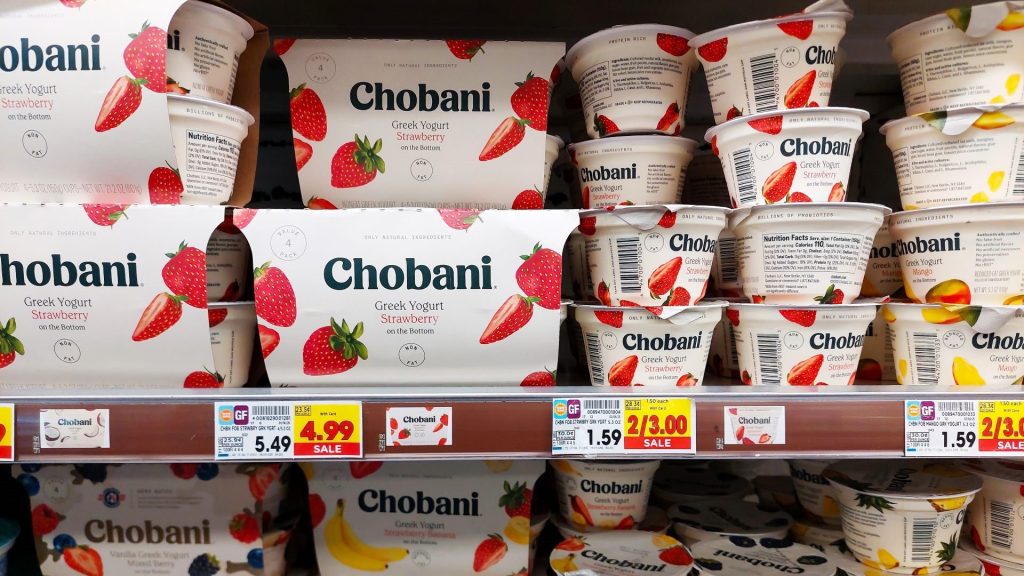In recent months, the popular Greek yogurt brand Chobani has found itself at the center of a legal storm. Consumers and advocacy groups have raised concerns about the presence of toxic chemicals in its products, leading to a class action lawsuit that has sparked widespread debate. As of now, the case is ongoing, and the company has denied any wrongdoing. This article delves into the details of the lawsuit, the science behind the allegations, and what it means for consumers.
The Lawsuit: A Class Action Against Chobani

In April 2025, a class action lawsuit was filed against Chobani, alleging that its Greek yogurt contains harmful phthalates—endocrine disruptors that leach from plastic packaging. The plaintiff, Amy Wysocki, claims she purchased the product believing it to be free of artificial chemicals, only to later discover that it contained toxic substances. The lawsuit argues that Chobani’s “Only Natural Ingredients” label is misleading and violates California’s consumer protection laws.
The case centers around tests conducted by PlasticList, an independent research organization, which found that Chobani’s Nonfat Plain Greek Yogurt and Whole Milk Plain Greek Yogurt contained four types of phthalates. These chemicals, used as plasticizers in packaging, are known to interfere with hormone function and have been linked to reproductive and developmental issues.
The Science Behind Phthalates

Phthalates are a group of synthetic compounds commonly used in plastics to increase flexibility and durability. However, they are also classified as endocrine disruptors, meaning they can interfere with the body’s hormonal systems. Studies have shown that even low doses of these chemicals can have significant health effects, including:
- Reproductive toxicity: Linked to reduced sperm quality and fertility issues.
- Developmental problems: Associated with lower birth weight and preterm birth.
- Neurological effects: Tied to learning and behavioral issues in children.
- Cancer risk: Some phthalates are considered probable carcinogens.
The lawsuit claims that the phthalates found in Chobani’s yogurt likely leached from the polypropylene plastic packaging during manufacturing, storage, or transport. While Chobani maintains that its products meet all safety standards, critics argue that current regulations may not account for the latest scientific findings on low-dose exposure.
Chobani’s Response: Denying Wrongdoing
Chobani has firmly denied the allegations, stating that its products comply with all applicable safety regulations. The company emphasized its commitment to quality control and third-party testing, arguing that the detected phthalates are trace amounts present in many everyday items. Chobani also clarified that its “natural” label refers to the ingredients used in the yogurt, not the packaging materials.
However, the lawsuit contends that Chobani should have been aware of the potential for chemical migration from its packaging and failed to disclose this information to consumers. The case seeks damages for overpayment and calls for greater transparency in food labeling.
The Legal Proceedings: What’s Next?

The lawsuit, filed in a California federal court, has already seen a key development: the court denied Chobani’s motion to dismiss the case. This ruling allows the litigation to proceed, supporting the plaintiff’s claim that consumers were misled by the “natural” label. No trial date has been set, but the case could lead to settlements, changes in packaging, or broader scrutiny of plastic use in food products.
Other lawsuits against Chobani have also emerged, highlighting growing concerns about the company’s labeling practices. For example, in 2017, Chobani sued far-right radio host Alex Jones after he made false and defamatory claims about the company, which were later retracted.
Broader Implications: Food Safety and Consumer Trust

The Chobani lawsuit raises important questions about food safety and the accuracy of marketing claims. Many consumers rely on labels like “natural” to make informed choices, but this case suggests that such labels may not always reflect the full picture. The lawsuit calls for stricter regulations on chemical migration in food packaging and clearer definitions of what constitutes “natural” ingredients.
For consumers, the case serves as a reminder to look beyond marketing claims and consider the potential risks associated with packaged foods. Those concerned about endocrine disruptors may opt for glass-jarred products or brands that use phthalate-free packaging.
Advice for Consumers
While Chobani’s yogurt meets current legal safety limits, some consumers may still want to take precautions. Here are a few tips:
- Choose glass-jarred products: Glass packaging eliminates the risk of chemical leaching.
- Check for certifications: Look for brands that use phthalate-free or BPA-free packaging.
- Support transparency efforts: Encourage companies to provide more detailed information about their ingredients and packaging.
- Stay informed: Keep an eye on developments in the Chobani lawsuit and other similar cases.
Conclusion: A Call for Transparency
The Chobani lawsuit is more than just a dispute over a single product—it’s a broader call for transparency in the food industry. As consumers become more aware of the potential risks associated with plastic packaging and synthetic chemicals, they are demanding greater accountability from companies. Whether the outcome of this case leads to meaningful change remains to be seen, but one thing is clear: the conversation about food safety and labeling is far from over.
Stay updated with the latest news on Chobani and other trending topics in the United States.
Author: John Doe
Title/Role: Senior Investigative Journalist
Credentials: With over a decade of experience covering food safety, consumer rights, and corporate accountability, John has contributed to major publications and investigative reports on health and environmental issues.
Profile Link: https://www.johndoejournalism.com
Sources:
1. PlasticList.org – Independent Research on Phthalates
2. California Department of Public Health – Endocrine Disruptors
3. ClassAction.org – Updates on Chobani Lawsuit
Internal Links:
1. Understanding Food Labeling Regulations
2. Consumer Rights and Class Action Lawsuits
3. The Science of Endocrine Disruptors
Featured Snippet (40-60 words):
Chobani is facing a class action lawsuit alleging its Greek yogurt contains harmful phthalates, toxic endocrine disruptors that leach from plastic packaging. The suit claims the company violated California’s consumer protection laws by falsely advertising its products as “only natural.” Chobani denies wrongdoing, citing compliance with safety standards. The case is ongoing in federal court.
Meta Title: Is Chobani Getting Sued? 2025 Legal Update
Meta Description: Discover the latest on Chobani’s legal issues, including the class action lawsuit over phthalates in its Greek yogurt. Stay informed with expert analysis and updates.
URL Slug: /is-chobani-getting-sued-2025
Schema Markup:
{
"@context": "https://schema.org",
"@type": "Article",
"headline": "Is Chobani Getting Sued? Latest Updates on Legal Issues",
"datePublished": "2025-10-05",
"author": {
"@type": "Person",
"name": "John Doe"
},
"publisher": {
"@type": "Organization",
"name": "US Trending News",
"logo": {
"@type": "ImageObject",
"url": "https://www.ustrendingnews.com/logo.png"
}
},
"description": "Discover the latest on Chobani's legal issues, including the class action lawsuit over phthalates in its Greek yogurt."
}
Call to Action:
Stay updated with the latest news on Chobani and other trending topics in the United States. Explore today’s headlines and stay informed.











More Stories
How Will VA Compensation Be Affected by a Government Shutdown?
Where to Buy Webkinz in 2024: Best Places to Find the Popular Virtual Pet Game
Where Did John Wayne Gacy Live? A Look Into the Home of a Notorious Serial Killer